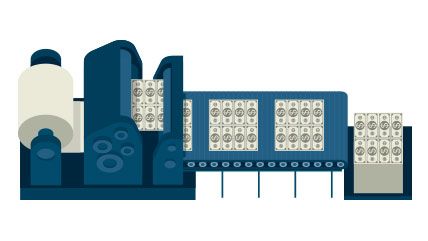Modern Monetary Theory Is Supply Side Economics—but for the Left

Most people like new stuff more than they like paying for it. Poll a few thousand Americans about whether they'd enjoy having a BMW, and most would probably say yes. Ask how they'd feel if told it would cost them $40,000, and the prospect of a new 3 Series would likely become markedly less popular.
This facet of human nature explains an iron law of American politics: People like government benefits; they just don't like paying for them. Ask people whether they like Medicare for All, as the Kaiser Family Foundation did in January, and you'll find a clear majority—56 percent—giving it the thumbs up. Tell them it would require higher taxes, and support plummets to 37 percent. Everyone wants a BMW; few people want to pay for one.
Granted, single-payer health care is more like a Yugo than a BMW, but the same principle applies. That's why enterprising lefty politicians are touting an economic theory some say could allow the federal government to fund programs like Medicare for All, enormous new infrastructure, and ambitious environmental legislation of massive scope and untold cost—perhaps without paying for it at all.
Proponents of Modern Monetary Theory (MMT) argue that the government can afford to purchase anything, because it can create unlimited amounts of its own currency. In this model, bond markets and deficits aren't meaningful checks on government spending. The only real constraint is inflation, which can occur when the economy is at full employment, and which should be addressed via tax hikes and spending reductions.
Essentially, MMT is an argument that inflation and employment should be managed through fiscal policy—spending and taxation—rather than through interest rates set by a central bank, as monetarists like Milton Friedman preferred. It puts Congress rather than the Federal Reserve in charge of macro-economic steering.
In its more nuanced form, there is something to MMT: Strictly speaking, the government always can print more money, though whether it should is another question. And most economists would agree that government spending and taxation do affect inflation.
Some MMT adherents in Congress and online political debates, however, have taken this complex idea to mean something rather more simplistic: Deficits don't matter. Not right now, anyway, and maybe not ever.
That's part of what drove a brief squabble in January over whether the new Democratic majority in the House would adopt pay-as-you-go rules, which require offsets—either spending cuts or tax hikes—to new government expenditures, in order to curb the deficit. Speaker Nancy Pelosi (D–Calif.) favored the rule, but a handful of left-leaning up-and-comers including Rep. Alexandria Ocasio-Cortez (D–N.Y.) argued that the requirement would hinder Democratic efforts to pass big-ticket legislation such as single-payer health care. The underlying question—do deficits matter?—will be a part of liberal policy conversations heading into 2020, as Democratic contenders decide whether to back proposals that would radically increase outlays. Leading candidates, including Sen. Elizabeth Warren (D–Mass.) and Sen. Kamala Harris (D–Calif.), have already challenged the idea that new government spending must be offset.
That notable lawmakers like Ocasio-Cortez and Warren are flirting with this notion is, perhaps, a sign of a flaw in MMT thinking: It relies on Congress to raise taxes and cut spending in order to combat inflationary spirals, should they occur—yet congressional adherents are mostly drawn to the allure of being able to spend more without commensurate spending cuts or tax hikes.
It's an economic theory deployed selectively for political convenience—and also, perhaps, out of envy. For roughly 40 years, Republicans have embraced an overly simplified version of "supply-side economics," which posits that tax cuts spur economic growth, which in turn generates additional tax revenue. That means tax cuts can "pay for themselves" by leading to more total money paid in taxes, thanks to the growing economy, than what was lost from the rate cuts. In theory that can happen, but only rarely, when tax rates are very high to begin with. Yet many Republicans legislate as if tax cuts always pay for themselves, thus sparing them the political consequences of offsetting lost revenue by trimming spending.
Like the simplified version of MMT, it's a way of enacting popular policy preferences while pretending there's no downside. Not only can legislators give the people what they want—they can promise it will be free, and let some future sap deal with the bill when it comes due.
This article originally appeared in print under the headline "Modern Monetary Theory Is Supply Side Economics—but for the Left."


Show Comments (43)